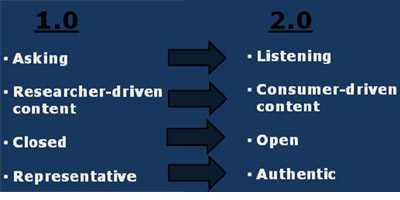"Market Research: Web 1.0 in a Web 2.0 World," a study conducted by four Tuck MBA students, looks at how market research firms can take advantage of new technologies and bring their methodologies progressively closer to the natural activities of internet users.
The market research industry is currently seeing increasing demand for research services, driven mainly by increased research on existing products and new product development. Yet while market research revenue as a whole is growing, the industry is becoming increasingly competitive. Firms are challenged to provide differentiated research at a lower cost point, and to provide survey results quickly. This trend of providing lower cost, more timely market research has blurred the lines between high and low quality data collection and analysis.
A clear opportunity is emerging for firms to take advantage of the Web 2.0 paradigm to learn more about their customers, by finding innovative new ways to listen to user-generated online content rather than to ask specific questions.
Click here to read the Research Note.

Characteristics of online market research 1.0 and 2.0
 |
 |
|
 |
Jason Freedman T'08: "I’m pretty psyched to have focused on the business side of Openvote [a startup and potential online market research tool]. I spend so much time on the user experience and have never enjoyed thinking about monetization. When I talk to investors on the user experience, their eyes glaze over. I think an innovative, realistic business model will be compelling." |
|
 |
 |
|
 |
Colin Van Ostern T'09: "Ultimately, the explanations and visual aids that we used to explain our emerging theories to each other became the foundation for the narrative of the study: that the market research industry is poised to undergo the same shift to a Web 2.0 paradigm that the media and advertising industries had before it." |
|
 |
 |
|
 |
Emily Nielsten T'08: "Through this study, I have become well-versed in the products offered and competitive landscape, industry change over time, motivations of users and providers of data, challenges market researchers and marketers face, and potential for where the industry may be going." |
|
 |
 |
|
 |
Evan Konwiser T'08: "Our team brainstorming sessions were the best part. Many times over we re-invented how we thought about the space and arrived at unique ways to think about a concept or an innovative application." |
|
 |
 |
Project faculty advisors:
M. Eric Johnson, CDS Director and Gregg Fairbrothers, Dartmouth Entreprenurial Network





![]()







